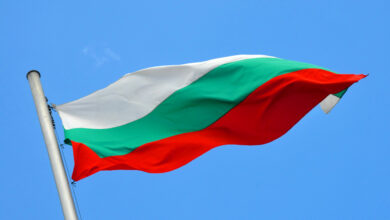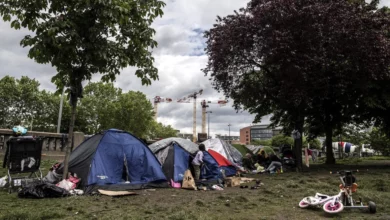When a game of pool is at stake, 23-year-old Marwan Soltan develops a determined gaze as he analyzes his possible moves. His opponent and those watching the game in a smoky pool hall in Dokki comment on Soltan’s shots with the same melodic intonations, typical of the Libyan dialect.
Although competition is in the air, the men are Soltan’s support network in Cairo. Since leaving his family in Tripoli three months ago out of fear of pro-Qadhafi militias, the Libyan community in Cairo, whether through billiard games or Ramadan iftars, have become Soltan’s family-in-exile.
While there are no exact figures on Libyans like Soltan who went to Cairo to escape the threat of violence in Libya, the numbers are certain to decrease soon, as Soltan and his cohort prepare to return to a Libya no longer ruled by Muammar Qadhafi, the country’s strongman of over 40 years.
And with many having high levels of education and professional experience, they are prepared to contribute to the development of their homeland upon return.
The International Organization for Migration (IOM) estimates that 177,548 Libyans have crossed the border into Egypt from February to the end of June, which is when IOM ceased reporting on the numbers of Libyans crossing the border. At this time, IOM officials began observing a new cyclical trend of Libyans entering Egypt and reentering Libya, according to an IOM document.
Ayman Zohry, president of the Egyptian Society for Migration Studies, says that most Libyans in Egypt can be found in Egypt’s second largest city.
“Alexandria is their main destination since they have close ties to the city through marriage, investment, and ownership of houses and apartments,” Zohry says, adding that geographic proximity and tribal realities further contribute to Alexandria’s attractiveness for Libyans.
But some Libyans over the last few months chose Egypt’s capital as their temporary refuge following the outbreak of Libya’s 17 February revolution.
Magdi Naili, 26, says that he and his parents chose to move to Cairo instead of other cities because of family already living there, as well as the city’s affordability. “Life for my family is good here,” he says.
Naili, a graduate of political science from a Canadian university, is the media specialist and webmaster at the US Embassy in Tripoli. As an employee of the US State Department during NATO strikes in Libya, Naili had to exercise extreme caution.
“You had to pretend you were pro-Qadhafi in Tripoli,” he says. “You feared for your life and for your family’s life.”
Naili says that over time, “life became unbearable in Libya.” He lists the sound of gunshots, inflation, lack of cash, and a “lost sense of normalcy” that drove his family to leave Tripoli for Cairo in May.
Like Naili, Soltan says that he left Libya for security concerns largely resulting from his work in revolutionary activity. Soltan says that on 18 February, with friends and neighbors, he attacked an office belonging to a neighborhood committee affiliated with the Qadhafi government.
“We burned everything. It’s very dangerous to have this stuff. If they catch you with it, you’re dead. We burned and we ran,” he says.
In May, he determined that going to Cairo was best for him and his family.
“Militias are ruthless in their hunt for revolutionaries,” he says.
While in Cairo, both Soltan and Naili have been busy keeping up with Libya news, which they share via social media sites.
And both have been able to meet their needs without help from any governmental or non-governmental agency. Libyans who have spent the last few months in Cairo have either been self-sufficient or found support from other Libyans.
Fiona Cameron, director of St. Andrew’s Refugee Services in Cairo, says that Libyans have not sought her organization’s services to any notable degree. She recalls only a handful that stopped by months ago.
Soltan, a recent graduate in dentistry, has been dependent on funds sent by his brother in Tunisia. Until recently, he worked two nights a week at a private clinic as a dentist. For food, Soltan joins his Libyan friends for meals. During the month of Ramadan, Soltan eats iftar and sohour in homes of friends who invite him to join.
As opposition forces assume control of Libya’s capital, the lives of Libyans in Cairo are poised for massive change.
On the night between 21 and 22 August, following news that opposition forces had captured two of Muammar Qadhafi’s sons and were engaged in a battle for the newly named Martyrs’ Square, Libyans in Cairo made their way to the Libyan Embassy to celebrate Qadhafi’s fall.
Soltan, his third time protesting at the Libyan Embassy in Cairo, joined the crowd in cheering and singing for what he considers the liberation of his country. After celebrating and taking pictures with friends, Soltan went to eat sohour at the home of other Libyan friends.
Asked about Qadhafi’s impending fall, Soltan says, “I’ll be happy.” But his thoughts are on returning home. With Qadhafi on the way out, Soltan is ready to return to Tripoli.
“I’m leaving in September, going home for sure,” he says.
Once home, Soltan will be able to see his mother and siblings again and finally become licensed to work as a dentist in Libya.
Naili plans to return to Tripoli after attending family events in Canada next month. And he plans to use his knowledge of media and diplomacy to contribute to the new Libya.
“I hope to join the diplomatic corps to present Libya positively to the world,” Naili says. While in Canada, he plans to visit the Libyan Embassy in Ottawa to offer his services.
His long-term goal is to change the international perception of his homeland. He wants people to perceive Libya as attractive for tourism and investment, instead of associating the country with pariah-status and terrorism.
“We want to present a new Libya to the world," he says.
And he is in a hurry to begin.
“I miss Libya very much. You don’t appreciate something until it’s gone,” says Naili.
“This is the first time I say I want to go back to Libya.”




